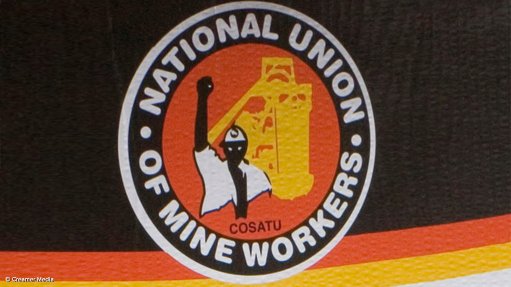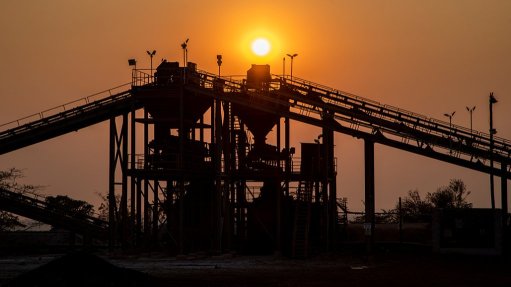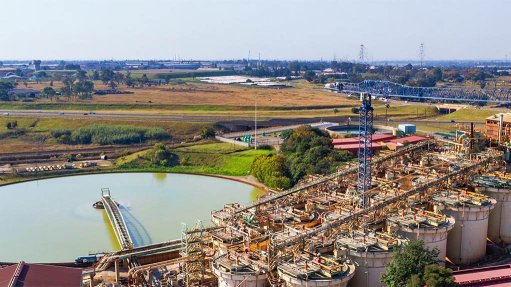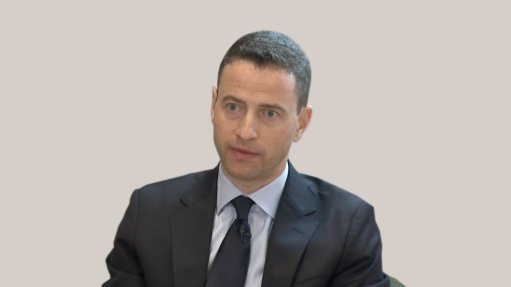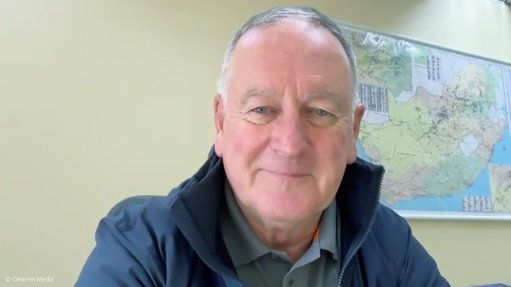Platinum-based green hydrogen on way to becoming South Africa’s new gold – CHIETA

CHIETA CEO Yershen Pillay interviewed by Mining Weekly's Martin Creamer. Video: Darlene Creamer.
JOHANNESBURG (miningweekly.com) – Three new green hydrogen qualifications are being registered with the Quality Council for Trades and Occupations (QCTO) to enable South Africa to seize the platinum group metals- (PGMs-) linked green hydrogen opportunity as its green shoots grow stronger roots at a time when the disrupted world is in eager need of a promising new planet-friendly economic direction.
Last month, the emerging green hydrogen fuel cell economy received a R90-billion stimulus opportunity from European Commission President Ursula von der Leyen, who urged South Africa while in Cape Town to get going on green hydrogen.
Then, at last week’s PGM Industry Day in Johannesburg, Anglo American reported that South Africa’s rejigged Hydrogen Corridor has been short-listed for Just Energy Transition Investment Programme funding.
Emerging simultaneously are enabling new green hydrogen qualifications, with South Africa’s Chemical Industries Education & Training Authority (CHIETA) working with sister sector education and training authorities (Setas) such as the Mining Qualifications Authority (MQA) and the Transport Education and Training Authority (TETA) on the green resource that has the strong potential to fundamentally transform the global economy and to reindustrialise South Africa.
“Green hydrogen’s becoming the new gold,” CHIETA CEO Yershen Pillay remarked to Mining Weekly in a Zoom interview. (Also watch attached Creamer Media video.)
CHIETA data suggests that the overall employment need embraces about 178 key skills and competencies, with the 17 that CHIETA needs to develop covering gas engineers, hydrogen systems engineers and hydrogen technicians.
Being registered by CHIETA with the QCTO are three new qualifications.
The first is that of a green hydrogen technology practitioner. This will ensure that you have the skill on site to manage your green hydrogen technologies, such as your electrolyser technologies.
The second is that of a green hydrogen production practitioner. CHIETA has been working with some of its linked companies such as Sasol, Afrox, Air Products, Rheinmetall, and many of them require some form of production expertise to produce green hydrogen on site.
The third qualification is that of a green hydrogen storage and fuel transporter, because transporting hydrogen is very dangerous. It's a gas that is highly explosive, especially at high temperatures. Safety standards are needed and people will have to be qualified to transport and store green hydrogen.
“These are the three qualifications that we're contributing as the chemical Seta to ensure that we have an adequate skills infrastructure to seize the green hydrogen opportunity as a country,” Pillay explained.
“Our entire development process is informed by our stakeholders. The companies themselves, the training providers, all approached us as CHIETA, and they said to us that this is where the demand lies. We need pipe fitters, for example, on site and they need to be adequately trained.
“What we've been able to do is to work closely with likes of Sasol, Air Products and various other companies like Rheinmetall, who say they will be able to absorb these skills.
“We have plans to implement the first-of-its-kind Green Hydrogen Centre of Specialisation. This centre of specialisation is going to be in collaboration with our higher education institutions, such a universities, as well as our technical and vocational education and training (TVET) colleges.
“We are collaborating with some of our sister Setas - the MQA, as we know, there are quite a few developments in the mining space - with companies like Anglo American venturing into green hydrogen trucks, et cetera. and then we've collaborating with TETA on the transport side.
“Ninety-five per cent of the green hydrogen economy is transport orientated, so without transport infrastructure, we will not be able to import components or export green hydrogen.
“We're going to be identifying at least two universities. We're looking at University of Johannesburg, which has got a green hydrogen chairperson, for example, and they have some expertise in that area.
“We haven't yet identified TVET colleges, but the Green Hydrogen Centre of Specialisation will be hosted in one of these TVET colleges and universities, such as University of Johannesburg, in collaboration with other Setas.
Mining Weekly: The world is also transforming digitally. What is the CHIETA doing to train people to be able to cope with digital advance?
Pillay: We're living in a digital First World, so we need to have digitally savvy, digitally literate and data literate citizens. One of the things that we're looking to do is to bridge this digital skills divide that currently exists in the country. The data from Statistics South Africa indicates to us that only 1.7% of rural households have fixed Internet access at home, which means that the vast majority of our more than 30% of rural communities [nationally], cannot access the Internet and digital technology. We currently talk about Fourth Industrial Revolution (4IR) when we've got so many of our poor rural communities who are left behind. To ensure that no one is left behind, one of the things we've established are Smart Skill Centres, which are designed to address this problem of a digital divide between urban and rural communities. The Smart Skill Centres are spaces for training using digital technologies such as virtual reality, augmented reality, and AI, to close the digital skills gap. If you’re in the chemical sector and you’re an analytical chemist, you could be upskilled as a data scientist, which then broadens your horizons for new opportunities to then also be eligible for more opportunities as a data scientist, or to exploit the opportunities that the 4IR brings with it. We've established about six of these Smart Skill Centres. They are all in rural communities, from Saldanha Bay to Modjadjiskloof in Limpopo, and we’re working with the private sector. This is a practical example of a public-private partnership in action. We have our Gauteng Smart Skill Centre, which is going to be with the PG Glass Group, one of the largest commercial glass producing companies in the country, and the centre will ensure, together with the PG Glass Group, that we bring gamification, AI to training glass fitters, for example, for the glass sector, and making sure you have tech savvy artisans. Our goal is to have nine Smart Skill Centres, one in each province. Thus far, more than 26 000 rural poor have been trained with some form of digital skill that could range from expertise as a cybersecurity practitioner or a Java developer or a data scientist, and therefore able to access new opportunities through our Smart Skill Centre. We're working closely with the private sector to have one Smart Skill Centre in every province by the end of this year.
Is the global transition towards the circular economy also driving demand for new skill sets within the chemicals industry?
Absolutely. As a chemical Seta, we’re involved in addressing water poverty, or the problem of water scarcity. What we've found is insufficient incentive for businesses, for example, to see what's in it for them in terms of ensuring that they reuse, recycle water as a circular resource in their businesses. We've been working tirelessly to lobby and advocate for water as a circular resource, ensuring that we address the problem of water poverty in the country, but using innovative means. More than three-million people lack access to decent water. Only 26% of our municipalities have capable water infrastructure. We see this as a water opportunity that we can seize. We believe that if you train enough SMME startups, you could be able to close the gap in some of the water challenges. We could be able to see more jobs being created and more water engineers being trained. We're also looking at new technologies that ensure that we capture water from the air, because there's more water in the air than there’s water in the rivers and dams. We want to have these types of water harvesting technologies so that in almost every rural community you can capture water from the air, and turn that into a commodity that could be utilised in the communities.
CALL TO PUBLIC-PRIVATE ACTION
More public-private collaboration is needed to meet the challenges. “Let's have much more high impact collaboration that addresses specific problems and have certain high-impact measures so that we do get to a state where we’re making a dent on youth unemployment, under development, et cetera.
“Fundamentally, it's a call to action for greater high impact collaboration across sectors, between both the public and private sectors, and communities,” Pillay added.
Startups in the chemical industry are introducing modern technologies, such as AI and computational chemistry, and solutions for the circular economy and biotechnology.
They tap into corporate venture funding and collaborate with academic spin-offs and entrepreneurs to commercialise innovative ideas.
The influx of startups is bringing in fresh talent and expertise.
CHIETA, MQA and TETA soft-launched the Green Hydrogen Centre of Specialisation at the Council for Scientific and Industrial Research in September last year.
The Green Hydrogen Centre of Specialisation will offer hybrid training programmes focusing on continuous professional development, with specialised courses aimed at upskilling and reskilling individuals for the green hydrogen and derivatives industry.
These programmes will be delivered in collaboration with selected universities, universities of technology and TVET colleges, targeting National Qualifications Framework Level 5 or higher qualifications.
The Green Hydrogen Centre of Specialisation is aimed at developing the requisite skills that are required for the growing green hydrogen economy, to ensure that this is developed holistically and to position the country competitively in the region and world, capitalising on its resources including platinum group metals and renewable energy, speakers pointed out.
REINDUSTRIALISATION OPPORTUNITY
Green electrons and green molecules are presenting South Africa with a massive opportunity to reindustrialise, Nedbank CIB head of infrastructure, energy and telecommunications Mike Peo told last year’s Green Hydrogen Roundtable.
“We have an opportunity for South Africa to completely reindustrialise, to start building up our industrial base that we have lost over the last ten to 15 years,” was Peo’s inviting message at the event, which was also addressed by Higher Education and Training Department deputy director-general Zukile Mvalo as well as Pillay.
The outlook comes amid the far-reaching current generation of renewable solar and wind energy and the big volumes of renewable-energy generation planned, which provides scope for the generation of green molecules in addition to green electrons.
Those in the know have outlined that there are 30 to 40 very specific types of opportunity that can arise as a consequence of building green hydrogen and green ammonia production plants and having green molecules that can be utilised.
Article Enquiry
Email Article
Save Article
Feedback
To advertise email advertising@creamermedia.co.za or click here
Press Office
Announcements
What's On
Subscribe to improve your user experience...
Option 1 (equivalent of R125 a month):
Receive a weekly copy of Creamer Media's Engineering News & Mining Weekly magazine
(print copy for those in South Africa and e-magazine for those outside of South Africa)
Receive daily email newsletters
Access to full search results
Access archive of magazine back copies
Access to Projects in Progress
Access to ONE Research Report of your choice in PDF format
Option 2 (equivalent of R375 a month):
All benefits from Option 1
PLUS
Access to Creamer Media's Research Channel Africa for ALL Research Reports, in PDF format, on various industrial and mining sectors
including Electricity; Water; Energy Transition; Hydrogen; Roads, Rail and Ports; Coal; Gold; Platinum; Battery Metals; etc.
Already a subscriber?
Forgotten your password?
Receive weekly copy of Creamer Media's Engineering News & Mining Weekly magazine (print copy for those in South Africa and e-magazine for those outside of South Africa)
➕
Recieve daily email newsletters
➕
Access to full search results
➕
Access archive of magazine back copies
➕
Access to Projects in Progress
➕
Access to ONE Research Report of your choice in PDF format
RESEARCH CHANNEL AFRICA
R4500 (equivalent of R375 a month)
SUBSCRIBEAll benefits from Option 1
➕
Access to Creamer Media's Research Channel Africa for ALL Research Reports on various industrial and mining sectors, in PDF format, including on:
Electricity
➕
Water
➕
Energy Transition
➕
Hydrogen
➕
Roads, Rail and Ports
➕
Coal
➕
Gold
➕
Platinum
➕
Battery Metals
➕
etc.
Receive all benefits from Option 1 or Option 2 delivered to numerous people at your company
➕
Multiple User names and Passwords for simultaneous log-ins
➕
Intranet integration access to all in your organisation











